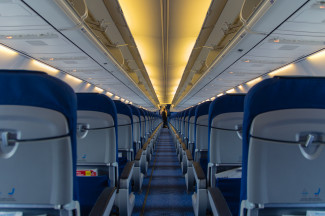
Johns Hopkins UniversityEst. 1876
America’s First Research University
How Will International Travel Change After the Coronavirus Pandemic?


By Charles E. Davis, M.D.
St. Augustine famously observed that the world is a book and those who do not travel read only a page. But how many pages will we read after the devastation of the Coronavirus crisis? Will fear, the struggling global economy, and reminders by the media of previous travel-related pandemics cause dramatic changes in the use of airlines for tourism and business-related travel, or will old habits and the release from self-imposed isolation spark an early return to the previous norm?
Factors likely to decrease airline travel after the pandemic resolves
Fear will linger long after the virus has receded. Early on, many will question whether the pandemic is really over. This is a realistic concern because a number of experts have raised the possibility that COVID-19 will become a seasonal infection. The general public has also been repeatedly reminded by the media that international travel has been the major contributor to other pandemics including the role of American troops spreading the Spanish flu, airline travel promoting the SARS outbreak, and steamships bringing plague to San Francisco in 1900.
The health of the economy in the short to intermediate-term will also have a major effect on airline travel. Unemployment levels of 20% or higher and huge losses of investments by the affluent suggest that discretionary funds for tourism will be severely curtailed during the short to intermediate-term. The gross domestic product shrank by 4.8% in the first quarter of this year, and the Congressional Budget Office estimates that the GDP will plunge at a 40% annual rate in the second quarter. In a recent interview Former Chair of the Federal Reserve, Janet Yellen, said that unemployment might reach depression levels but hopes for a much quicker recovery than in the Great Depression.
Advances in telecommunications may have an even larger effect. The successful use of teleconferencing during this pandemic is likely to have a profound effect on international conferences of all kinds. In particular, why would big business spend money for in-person international conferences after successfully using teleconferences during this crisis? International medical and scientific conferences have had equal success and have fewer funds for such purposes than big business.
International students have been an academic and financial boon to universities in the U.S. Decreased travel and the current administrations’ dislike of visas for all foreign immigrants could blunt this source of income and enrichment for our institutions of higher learning. The pandemic has also forced our professors and students to adapt to online learning. As they become more proficient at distance learning and universities find that it is advantageous for some courses, the administration could seize on this excuse to deny entry to some foreign nationals.
Finally, there is the problem of the financial state of airlines. Although they have received government-sponsored stimulus funds, all have cut back drastically on the number of flights and routes. Lufthansa has permanently retired 18 of their large aircraft with no plans to replace them. Their spokespeople say that it will take years for air travel to return to normal. Other airlines are beginning to follow suit. The European plane maker, Airbus, announced that they are reducing production by about a third, and Boeing has made the largest production cuts in its history. Fewer aircraft, as well as curtailed routes and available seats, will further reduce airline travel.
Factors that favor a return to normal airline travel after the pandemic
Release from boredom and isolation. I’m free now! Will a return to normal everyday routines and the sense of renewed freedom promote airline travel with fewer routes and seats even if individual discretionary funds are limited? In his 1947 novel about the devastation of the Black Death in a fictional city in Morocco, Camus asserts that people are habit-bound, and it takes them far too long to stop following their normal routines of travel and recreation. Although he was writing about behavior during the plague, his comments could well apply to attitudes after the plague resolved. For more on this see Virginia Heffernan’s “The Tyranny of Habit in The Internet and Art.”
Airlines are also likely to offer strong inducements in an attempt to recoup losses. Expect to see widespread fare reductions and special deals with partner hotels, car rental companies, and travel agencies.

What more can airlines and passengers do to promote safety
Some changes should have been made before the pandemic. There are a number of instances of the transmission of infectious diseases on airplanes long before this pandemic. Although many studies have shown that the air on large commercial aircraft is safe, infections can still spread. One well-known instance was the transmission of a multiple drug resistant strain of TB to several passengers on an international flight (Kenyon, et al. N Eng J Med, 334: 933-38, April, 1996). Proximity to the TB patient was the major factor in determining who became infected. While the WHO concluded that more careful screening of patients is the only realistic safeguard against TB transmission, it may be time for airlines, with support from governments, to provide more individual seat space. We know that distancing is the best safeguard against transmission of influenza and the SARS virus that causes COVID-19. We should act on that knowledge.
Travelers could also learn important lessons from this pandemic. Few international travelers seek advice about the necessary immunizations and prophylactic medications necessary to protect themselves from infections that may be prevalent at their destinations. For instance, almost all of the more than 1,000 annual malaria infections among American travelers to endemic tropical countries occur in individuals who either took no prophylactic medications or took them improperly. Travelers to industrialized countries have an even poorer record. During the recent outbreak of measles in Europe, American travelers, who were not immunized or failed to get boosters, caused the U.S. to have a sufficient number of outbreaks to risk losing the status of a measles-free country.
Conclusions
I doubt that we will read many more pages of St. Augustine’s “book” in the near future. Fear and the disastrous effect of the pandemic on the economy are likely to overcome the natural inclination of individuals to resume normal lives after resolution of the crisis. What appears to be a long-term severe cutback by airlines will discourage even the most affluent and determined traveler. Furthermore, the expansion of the digital age to include less expensive teleconferencing and online learning will render some travel superfluous.
The hope is that the pandemic will also encourage the public to adopt better health habits and to protect themselves from co-morbidities like lung disease, heart disease, diabetes, and obesity. We have all heard daily about the increased death toll among individuals with these conditions. Perhaps this experience will be more effective than the usual public health announcements and admonitions from our personal physicians.
Charles E. Davis, M.D., a specialist in microbiology and infectious diseases, is professor emeritus of pathology and medicine at the University of California, San Diego, and director emeritus of microbiology at the UCSD medical center. He is the author of The International Traveler's Guide to Avoiding Infections.


